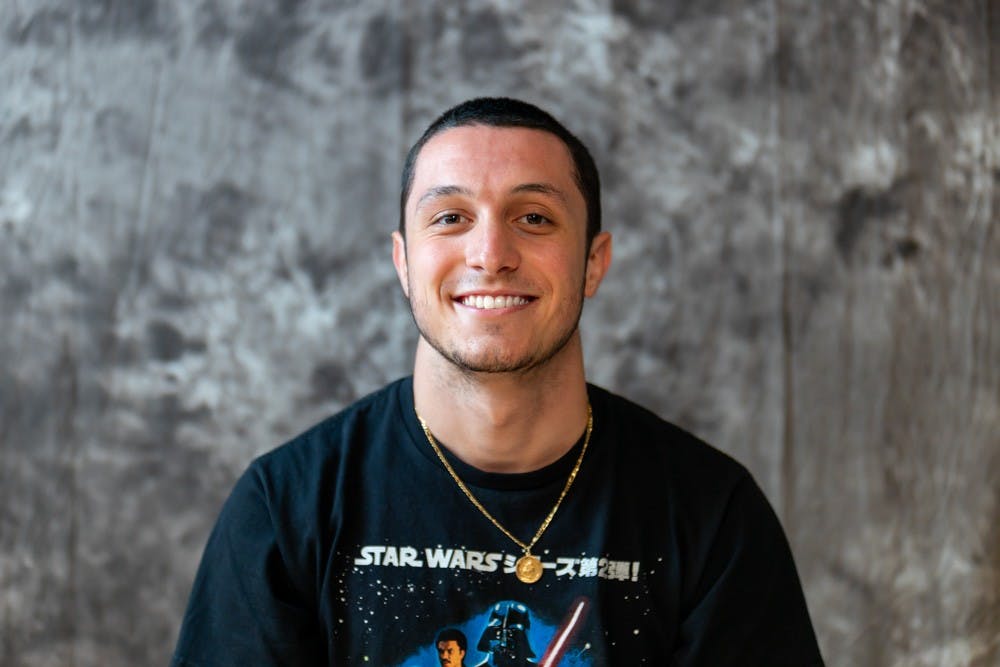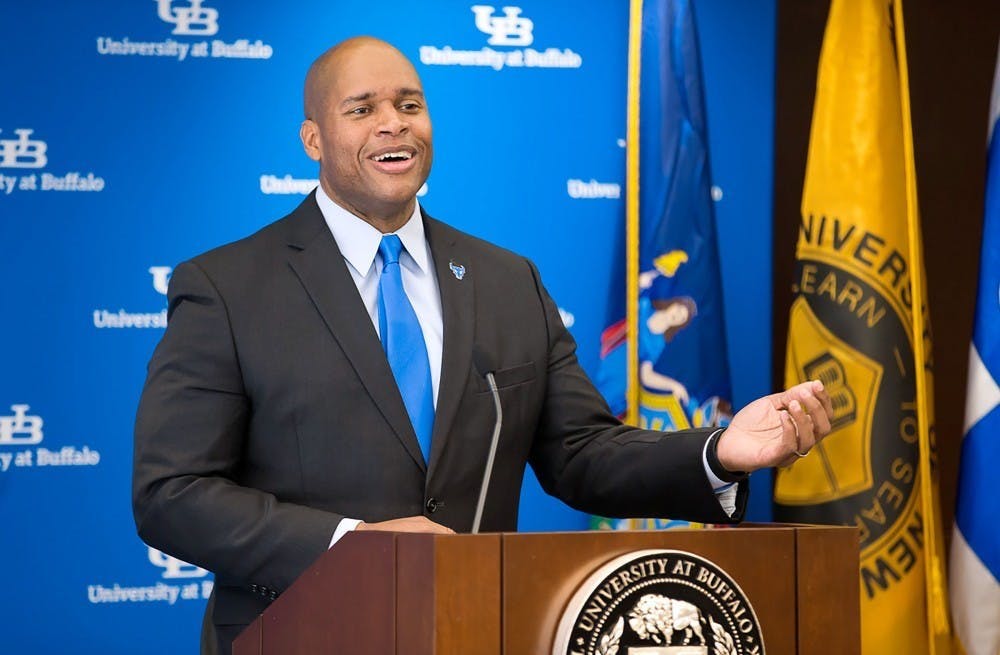The Mid-American Conference’s decision to postpone the fall sports season due to COVID-19 concerns sent shockwaves through the sports world. The MAC became the first conference to cancel their fall sports season, with the Mountain West and Big Ten following suit shortly after. UB Athletic Director Mark Alnutt, a member of the NCAA Football Oversight Committee as well as the MAC’s fall sports re-scheduling committee, worked with athletic directors from other schools to determine the fall sports season fate.
The Spectrum “sat down with” Alnutt to discuss how the MAC came up with its decision to postpone, the possibility of UB athletes transferring to schools who decide to play and what’s next for the fall athletes whose season is put on hold.
Q: What steps were taken to come up with the decision to ultimately postpone?
A: “You know just evaluating the situation at hand, a long, long process. As we were going into this we had an opportunity to put together a plan to return to sport back in May, and that was based on where we felt nationally, we would be with this virus in regards to cases, in regards to testing and everything else. But as we’ve gone through the summer, we’ve seen nationally, not just here in western New York, that there were spikes in a lot of different areas.
“As we continue to meet, and I say we mean the MAC ADs in conjunction with the commissioner, and in the same token commissioner meeting with our council presidents, you know we involved our medical advisory group. And as we move forward with these meetings, there was just a growing skepticism. Again, not necessarily a “no you can’t do it,” but a skepticism based on, so many questions remain about this virus.
“So as we moved towards last Saturday to finally have that vote by our council of presidents, it was a unanimous vote which we all support. Just the determination from evaluating the situation at hand, the information from our medical advisory group, and then as I mentioned before, just the so many questions regarding this virus that we didn’t have the answers for, the determination was made.”
Q: You felt it was the safer decision to make correct?
A: “Yeah, we did. We did, and also moving forward I mean we were the first FBS Conference to do it. So we felt that, you know, there was a discussion there. I mean, do we be the first and then go out there and see what happens? Do we wait until some of the other conferences come out?
“The reason why we felt comfortable with moving ahead is, we also knew internally, our coaches needed an answer, our student-athletes needed an answer so we might as well move forward in one way or another and so we made that decision.”
Q: How does this decision impact the winter and spring sports and their student-athletes?
A: “It’s just fall right now so it's a postponement of the fall sports at this time. Again, we’ll continue to evaluate the situation, it’s a very fluid situation as you know. But in regards to our winter sports, the men’s and women’s basketball, wrestling, swimming and diving, indoor track that we sponsor here at UB, it’s going to be, I don’t want to say business as usual because there's still a lot of protocol and guidelines that we follow. But at this point in time, and we’ll continue to evaluate that, the winter seasons are as is.”
Q: What would you say are the next steps for these fall sport student-athletes who don’t necessarily have this season? We’ll see if we can play in the spring, but as of now what do you think are the next steps for these athletes?
A: “Well for us it’s, you know they’re here at UB so we’re going to give them the opportunity to prepare which is the appropriate thing to do. They’re in a good environment here, a safe environment here. Will there be a few that want to go home and come back for school? Yes, we’ll allow that.
“What we’re working on collectively as the MAC, we set some parameters in terms of the amount of hours that they can continue to work out, practice, and in some capacity, have team meetings, whatever the case might be.
“We’re also having discussions at the NCAA level to just have some conformity in terms of these sports. What is allowed to happen until their seasons kick off in the spring semester? The overriding sentiment there was, we need to get them some activity, we need to put them in a routine. We need to still conduct it safely and we’ll continue to do that.
“As of right now, it’s, I’m not gonna say business as usual but we have kind of “branded in” somewhat, but also provide them the opportunity to do the strength and conditioning aspect of it and then once we get verification more from the NCAA to have more of a uniform standard across the board as we move forward to the spring.”
Q: You mentioned a uniform standard. I find that interesting, especially because some conferences aren’t fully on-board with postponing yet. Do you have at least a slight fear that some of the conferences like the SEC or the Big 12, who haven’t decided to postpone yet may try to “poach” UB athletes and possibly try and take them and have them transfer?
A: “Well you know that transfer issue is prevalent regardless of the situation we’re in. For us, obviously our communication to our student-athletes is, when the decision came out Saturday with the Mid-American Conference, my message to them was keep your ear to the ground in terms of being able to follow the landscape of what’s happening here. (It’s) difficult being first because you don’t know if others are gonna follow you.
“But since then, with the Big Ten, the PAC 12, The Mountain West, all the various FCS conferences, there’s still some uncertainty there. Not one conference, the SEC, Big 12, or ACC have said, “you know what, we guarantee we will play football.” It’s more or less, they’re pushing for it, they're evaluating it still, they’re still following the advice of their medical and health experts and seeing what’s happening with this virus, so you know there’s no guarantee.
“I’ll hate for any of our student athletes to be able to make that decision that's emotionally based, and you know what if they do make that decision, and first of all if there’s even room from a scholarship standpoint with some of these programs and they end up being in the same boat that we’re all in. Expressing patience, obviously because it’s important and we’ll move forward from there.”
Q: With professional sports like the NHL and the NBA adopting a bubble concept, was that ever discussed and were any other concepts discussed in terms of playing?
A: “No because it’s just not feasible from the college level to separate your student-athletes, especially once school starts. In person classes versus remote, you know what have you, there’s not that possibility of having that bubble that we see being effective in the NBA and also the NHL.
“For us, the concepts that were discussed is obviously educating our student-athletes on what they need to do outside of the facilities, also inside the facilities as well and the going from there. The closest thing to a bubble that we will ever have, and again, this isn’t UB specific, it’s nationally on college campuses, is how we’re operating currently, being able to conduct camps prior to students coming in.
“With so many campuses now releasing students over Thanksgiving, we mentioned the winter sports earlier, there will be more of a form of a bubble after Thanksgiving for those student-athletes. But when we understand what the term bubble is and then put it in context on a campus, you just can’t do that.
Q: How does being a former student-athlete help you understand and relate to what these players have gone through? Obviously you didn’t have to go through a situation like this but you were a student athlete, so how does that help you relate to these student-athletes?
A: “I’m in their shoes. And what I mean there is just, having that experience. First of all, I feel for them as I mentioned on Saturday. Again, this is something that they’ve done most of their lives, they’ve had a routine every year for some, the past ten to twelve years, whatever the case might be.
“I understand, I get the disappointment, I get the high level of emotions right now. What I want to be able to provide for them is additional guidance throughout this process. “Hey let’s let the dust settle,” let’s concentrate, first and foremost on your mental well-being because that’s going to be important in terms of what support you might need because your routine has been disrupted.
“The second thing is having the physical well-being as well. Just to continue to prepare for whenever that season might be is going to be very important. I get it, I understand from being a student-athlete, but even if I wasn’t a student athlete, just having a career in collegiate athletics and understanding the importance of having this routine and now this has been disrupted.
“So for us it’s “okay, we know that the typical routine has been disrupted but let’s make a shift.” Let’s pivot over here and continue to offer the services and be able to keep them involved as best we can until there’s competition.”
Q: You’re on the NCAA Football Oversight Committee, what is that experience like especially during a time like this and what kind of insight did it give you in this situation?
A: “Well you know for me, very fortunate and honored to be on the football Oversight Committee. You know, able to represent the Mid-American Conference and around that table are the other nine FBS conferences and individuals from FCS along with NCAA folks so for us it's just a collection of individuals that are going to have their perspectives, you know obviously they have a great background in our sport. That leads to some very good conversations and discussion. As we move forward. It's still a body that is trying to push for what's best for the sport.
“Now we understand, there is some division right now in terms of the conferences as we talked about that are playing in the fall and the conferences that are moving to the spring. But the good thing about it is, we can have these conversations collectively.
“One thing that we're focusing on right now is “what does the activity look like for our football student athletes this fall who we're planning on participating in January?”
“So we can all have our ideas in terms of representatives from the Mountain West, Big Ten Pac-12, MAC. But it's also going to be good to hear others, you know.
“On the flip side too, for the sports that currently they are pushing forward, we can look at it collectively, in terms of what might be best for them so it's been a very good experience. For me personally, it was again getting a collection of people to go together and come out with a uniform standard.”
Anthony Decicco is the senior sports editor and can be reached at anthony.decicco@ubspectrum.com and @DeCicco42 on Twitter.

Anthony DeCicco is the Editor-in-Chief of The Spectrum. His words have appeared in outlets such as SLAM Magazine andSyracuse.com. In 2020, he was awarded First Prize for Sports Column Writing at the Society of Professional Journalists' Region 1 Mark of Excellence Awards. In his free time, he can be found watching ‘90s Knicks games and reading NFL Mock Drafts at 3 a.m.





